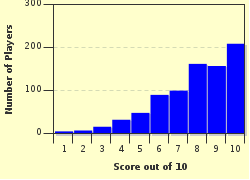Quiz Answer Key and Fun Facts
1. The word Shylock refers to a 'ruthless moneylender'. It is named after a fictional character created by William Shakespeare. In which work by Shakespeare does this character appear?
2. Romeo is the term used to refer to a lover. This word is of course derived from the name of a famous character created by William Shakespeare. What was the full name of this character?
3. 'Man Friday' is a phrase in the English language that is used to refer to a faithful manservant. From the work of which author does this phrase have its origins?
4. A difficult task is referred to as a 'Herculean' effort. How did this word originate?
5. The word Frankenstein is used to refer to any object or concept that turns against the very person who created it. The word originated from a famous novel 'Frankenstein'. Which of the following is NOT true about this novel?
6. The word Gargantuan is used to refer to any thing that is massive or gigantic. Do you know the origin of this word?
7. An Atlas is a book of maps. How did this word originate?
8. The word Scrooge is used to refer to a miserly person. The word originated from the name of a fictional character. Who created this fictional character?
9. Tantalus was a Greek character who was punished to stand below a fruit tree which would move up whenever he tried to take a fruit. From his name is derived a famous word which means 'to tempt'. Do you know which is this word?
10. An American humorist Gelett Burgess created a fictional character called Belinda. The surname of this character created a famous concept in book publishing. What was it?
Source: Author
deepakmr
This quiz was reviewed by FunTrivia editor
agony before going online.
Any errors found in FunTrivia content are routinely corrected through our feedback system.


